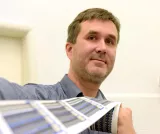Published: 10.01.2020
Bandages embedded with unique sensors that autonomously ask for redressing have been developed by Tomáš Syrový of the Department of Graphic Arts and Photophysics of the Faculty of Chemical Technology of the University of Pardubice after four years of hard work. The technology has been awarded the “2019 Visionary” award in the 9th year of a national competition for innovative projects.
“When bandage is applied to the body for a prolonged period of time, the wound does not heal well and weeps. On the contrary, when the bandage is removed early, this may have devastating effects for the wound site. The sensors embedded in the bandage will indicate the right moment for redressing,” says Doc. Tomáš Syrový.
In practical terms, not only will the invention make the life of patients and doctors easier, but it will also reduce the costs for wound management, as bandages tend to be replaced too early. “The time for redressing is indicated by a change of colour from grey to black. Both the patient and the healthcare staff will learn that redressing is needed,” adds Tomáš Syrový. Patients at home will also appreciate the invention as they will not need to rely only on the healthcare staff for treatment.
The sensor is also unique in that it is produced by printing. Unlike other products available on the market, it is independent of any electrical device. It consists of seven layers and its size is adjustable. “It may be the size of an adhesive tape, but also the size of a stomach bandage. Healthcare staff will use it mostly to rebandage varicose ulcers, which take several months to heal,” explains Tomáš Syrový. Another advantage lies in the sensor being enivronment-friendly and ready to be made into compost.
Various sensors developed by Tomáš Syrový in a number of cooperation projects are widely used in many industries. The sensors help detect heavy metals, check the quality of drinking and waste water, or detect gases. The sensors are also used in smart nappies for immobilized patients, which have been developed in cooperation with COC s.r.o. “We have developed a technology that makes it possible for us to print the sensor into nappies at a speed of 200 metres per minute. A wireless communication device will transmit information about the condition of the nappy from the sensor to the computer. This presents a considerable improvement for the nurses, and enhances dignity in terms of patients’ control,” adds Tomáš Syrový.
The new sensor for bandages has been developed as part of the FlexPrint project of a competence center of the Technology Agency of the Czech Republic in cooperation with the following industry partners: OTK Group a.s., Inotex spol. s.r.o. and COC s.r.o.


